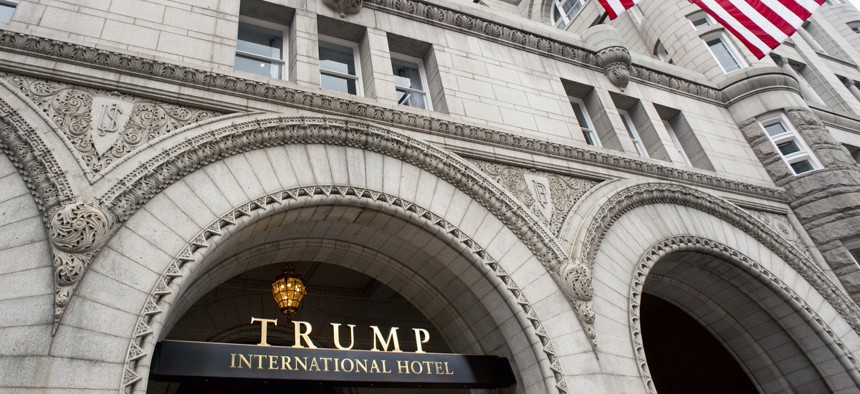
W. Scott McGill/Shutterstock.com
Trump Sees Big Boost in Income From Properties He Frequents As President
The president’s submission to the U.S. Office of Government Ethics claims tens of millions of dollars in income from his real-estate empire.
President Trump says he’s received tens of millions of dollars in income from the golf courses and resorts whose profile he boosted during frequent visits since taking office, according to filings released Friday by the U.S. Office of Government Ethics.
The 98 pages of financial disclosures offer a partial snapshot of Trump’s income and assets from January 2016 to April this year, as well as indications he’s reaped at least a partial windfall since his most recent filing with the Federal Election Commission last year. The filings offer less detailed information about his precise financial situation than would be obtained from his tax returns. Trump broke with modern precedents by refusing to release those returns on the campaign trail or during his presidency.
Properties that Trump frequently visited as president saw the largest boost in income. Trump claimed more than $37 million in income from Mar-a-Lago, the Palm Beach County resort in Florida he described as his “Winter White House,” as well as $20 million in income from the nearby golf club he owns in Jupiter, Florida. His claimed Mar-a-Lago income rose rapidly since his last two financial disclosures with the FEC: Trump reported more than $15 million in income from the resort in the 2015 report, followed by $29 million in the 2016 version.
Golfing and vacationing are bipartisan presidential traditions, as are the partisan critiques of the presidents who partake in them. But Trump has taken his leisure time to new levels both in volume and location. A May 5 analysis by The Washington Post found that Trump visited at least one of the properties he owned in 36 of his first 108 days in office, or one-third of his presidency to that time. The trips include almost weekly visits to Mar-a-Lago and his Florida properties, where he mingles with guests and club members as well as hosts foreign dignitaries.
Properties that saw fewer or no visits from the president produced no such boost in income for him. His golf club in Bedminster, New Jersey, which he only visited for the first time as president in May, brought in $19.7 million in income for him—about the same amount as in his 2016 filing. Other courses throughout the U.S. stayed flat or saw slight declines, while Trump-branded golf courses in Turnberry, Scotland, and Doonbeg, Ireland reported $14 million and $12 million in income, respectively.
The largest single source of income came from Trump National Doral Miami, a golf resort he purchased in 2012. The president reported $115 million from the resort in his 2017 filing, a hefty sum by any standard. But this year’s total represents a multi-million dollar decline in income: after reporting Doral earned him $131 million in income in his filing last year.
Complicating any assessment of Trump’s financial status is his history of providing mixed signals about incomes and revenues from his properties. At the Doral resort, for example, Trump reported more than $50 million in revenues in 2014 financial disclosure forms. But The New York Times reported he subsequently claimed the resort had actually recorded a net loss of more than $2 million when challenging his local tax bill before local Miami officials.
Trump’s 2017 filing did contain one unquestionably bright spot of income for the president. In the spring of 2016, when his presidential bid began to break away from his rivals, he reported royalties from his business-advice book The Art of the Deal amounted to between $50,000 and $100,000. Twelve months and one presidential inauguration later, the president reported those royalties now fell within the $100,000 to $1,000,000 range.







